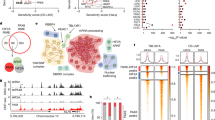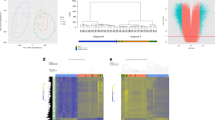Abstract
Oncogenic wingless-related mouse mammary tumour virus (Wnt) signalling, caused by epigenetic inactivation of specific pathway regulators like the putative tumour suppressor secreted frizzled-related protein 1 (SFRP1), may be causally involved in the carcinogenesis of many human solid tumours including breast, colon and kidney cancer. To evaluate the incidence of SFRP1 deficiency in human tumours, we performed a large-scale SFRP1 expression analysis using immunohistochemistry on a comprehensive tissue microarray (TMA) comprising 3448 tumours from 36 organs. This TMA contained 132 different tumour subtypes as well as 26 different normal tissues. Although tumour precursor stages of, for example kidney, colon, endometrium or adrenal gland still exhibited moderate to abundant SFRP1 expression, this expression was frequently lost in the corresponding genuine tumours. We defined nine novel tumour entities with apparent loss of SFRP1 expression, i.e., cancers of the kidney, stomach, small intestine, pancreas, parathyroid, adrenal gland, gall bladder, endometrium and testis. Renal cell carcinoma (RCC) exhibited the highest frequency of SFRP1 loss (89% on mRNA level; 75% on protein level) and was selected for further analysis to investigate the cause of SFRP1 loss in human tumours. We performed expression, mutation and methylation analysis in RCC and their matching normal kidney tissues. SFRP1 promoter methylation was frequently found in RCC (68%, n=38) and was correlated with loss of SFRP1 mRNA expression (p<0.05). Although loss of heterozygosity was found in 16% of RCC, structural mutations in the coding or promoter region of the SFRP1 gene were not observed. Our results indicate that loss of SFRP1 expression is a very common event in human cancer, arguing for a fundamental role of aberrant Wnt signalling in the development of solid tumours. In RCC, promoter hypermethylation seems to be the predominant mechanism of SFRP1 gene silencing and may contribute to initiation and progression of this disease.
This is a preview of subscription content, access via your institution
Access options
Subscribe to this journal
Receive 50 print issues and online access
$259.00 per year
only $5.18 per issue
Buy this article
- Purchase on Springer Link
- Instant access to full article PDF
Prices may be subject to local taxes which are calculated during checkout







Similar content being viewed by others
References
Behrens J, von Kries JP, Kuhl M, Bruhn L, Wedlich D, Grosschedl R et al. (1996). Functional interaction of beta-catenin with the transcription factor LEF-1. Nature 382: 638–642.
Bohm M, Wieland I, Sinhofer C, Otto T, Rubben H . (1997). Detection of loss of heterozygosity in the APC tumor suppressor gene in nonpapillary renal cell carcinoma by microdissection and polymerase chain reaction. Urol Res 25: 161–165.
Bubendorf L, Nocito A, Moch H, Sauter G . (2001). Tissue microarray (TMA) technology: miniaturized pathology archives for high-throughput in situ studies. J Pathol I 95: 72–79.
Caldwell GM, Jones C, Gensberg K, Jan S, Hardy RG, Byrd P et al. (2004). The Wnt antagonist sFRP1 in colorectal tumorigenesis. Cancer Res 64: 883–888.
Dressler GR . (2002). Tubulogenesins in the developing mammalian kidney. Trends Cell Biol 12: 390–395.
Esteller M . (2005). Aberrant DNA-methylation as a cancer inducing mechanism. Annu Rev Pharmacol Toxicol 45: 629–665.
Finch PW, He X, Kelley MJ, Uren A, Schaudies RP, Pupesco NC et al. (1997). Purification and molecular cloning of a secreted, frizzled-related antagonist of Wnt action. Proc Natl Acad Sci USA 94: 6770–6775.
Fink L, Seeger W, Ermert L, Hanze J, Stahl U, Grimminger F et al. (1998). Real-time quantitative RT–PCR after laser-assisted cell picking. Nat Med 4: 1329–1333.
Fukui T, Kondo M, Ito G, Maeda O, Sato N, Yoshioka H et al. (2005). Transcriptional silencing of secreted frizzled related protein 1 (SFRP 1) by promoter hypermethylation in non-small-cell lung cancer. Oncogene 24: 6323–6327.
He TC, Sparks AB, Rago C, Hermeking H, Zawel L, da Costa LT et al. (1998). Identification of c-MYC as a target of the APC pathway. Science 281: 1509–1512.
Hoei-Hansen CE, Nielsen JE, Almstrup K, Hansen MA, Skakkebaek NE, Rajpert-DeMeyts E et al. (2004). Identification of genes differentially expressed in testes containing carcinoma in situ. Mol Hum Reprod 10: 423–431.
Hughson MD, Johnson LD, Silva FG, Kovacs G . (1993). Nonpapillary and papillary renal cell carcinoma: a cytogenetic and phenotypic study. Mod Pathol 6: 449–456.
Janssens N, Andries L, Janicot M, Perera T, Bakker A . (2004). Alteration of frizzled expression in renal cell carcinoma. Tumor Biol 25: 161–171.
Kim AS, Kang YK, Kim JB, Kondo Y, Hirohashi S . (2000). Beta-catenin expression and mutational analysis in renal cell carcinomas. Pathol Int 50: 725–730.
Klopocki E, Kristiansen G, Wild PJ, Klaman I, Castanos-Velez E, Singer G et al. (2004). Loss of SFRP1 is associated with breast cancer progression and poor prognosis in early stage tumors. Int J Oncol 25: 641–649.
Lee AY, He B, You L, Dadfarmay S, Xu Z, Mazieres J et al. (2004). Expression of the secreted frizzled-related protein gene family is downregulated in human mesothelioma. Oncogene 23: 6672–6676.
Li CH, Amar S . (2006). Role of secreted frizzled-related protein 1 (SFRP1) in wound healing. J Dent Res 85: 364.
Lodygin D, Epanchintsev A, Menssen A, Diebold J, Hermeking H . (2005). Functional epigenomics identifies genes frequently silenced in prostate cancer. Cancer Res 65: 4218–4227.
Mancilla-Jimenez R, Stanley RJ, Blath RA . (1976). Papillary renal cell carcinoma: a clinical, radiologic, and pathologic study of 24 cases. Cancer 38: 2469–2480.
Mann B, Gelos M, Siedow A, Hanski ML, Gratchev A, Ilyas M et al. (1999). Target genes of beta-catenin-T cell-factor/lymphoid-enhancer-factor signaling in human colorectal carcinomas. Proc Natl Acad Sci USA 96: 1603–1608.
Marsit CJ, Karagas MR, Andrew A, Liu M, Darnaee H, Schned AR et al. (2005). Epigenetic inactivation of SFRP genes and TP53 alteration act jointly as markers of invasive bladder cancer. Cancer Res 65: 7081–7085.
Melkonyan HS, Chang WC, Shapiro JP, Mahadevappa M, Fitzpatrick PA, Kiefer MC et al. (1997). SARPs. A family of secreted apoptosis-related proteins. Proc Natl Acad Sci USA 94: 13636–13641.
Ortmann M, Vierbuchen M, Fischer R . (1991). Sialyated glycoconjugates in chromophobe cell renal carcinoma compared with other renal cell tumors. Indication of its development from the collecting duct epithelium. Virchows Arch B Cell Pathol Mol Pathol 61: 123–132.
Presti Jr JC, Wilhelm M, Reuter V, Russo P, Motzer R, Waldman F . (2002). Allelic loss on chromosomes 8 and 9 correlates with clinical outcome in locally advanced clear cell carcinoma of the kidney. J Urol 167: 1464–1468.
Reutzel D, Mende M, Naumann S, Schorkel S, Brenner W, Zabel B et al. (2001). Genomic imbalances in 61 renal cancer from the proximal tubulus detected by comparative genomic hybridization. Cytogenet Cell Genet 93: 221–227.
Schlegel J, Bocker T, Zirngibl H, Hofstadter F, Ruschoff J . (1995). Detection of microsatellite instability in human colorectal carcinomas using a non-radioactive PCR-based screening technique. Virchows Arch 426: 223–227.
Stoehr R, Wissmann C, Suzuki H, Knuechel R, Krieg RC, Klopocki E et al. (2004). Deletions of chromosome 8p and loss of sFRP1 expression are progression markers of papillary bladder cancer. Lab Invest 84: 465–478.
Storkel S, Steart PV, Drenckhahn D, Thoenes W . (1989). The human chromophobe cell renal carcinoma: its probable relation to intercalated cells of the collecting duct. Virchows Arch B Cell Pathol Mol Pathol 56: 237–245.
Suzuki H, Ueda T, Komiya A, Okano T, Isaka S, Shimazaki J et al. (1997). Mutational state of von Hippel-Lindau and adenomatous polyposis coli genes in renal tumors. Oncology 54: 252–257.
Suzuki H, Geabreilson E, Chen W, Anbazhagan R, van Engeland M, Weijenberg MP et al. (2002). A genomic screen for genes upregulated by demethylation and histone deacetylase inhibition in human colorectal cancer. Nat Genet 31: 141–149.
Suzuki H, Watkins DN, Jair KW, Schuebel KE, Markowitz SD, Chen WD et al. (2004). Epigenetic inactivation of SFRP genes allows constitutive WNT signaling in colorectal cancer. Nat Genet 36: 417–422.
Takada T, Yagi Y, Maekita T, Imura M, Nakagawa S, Tsao SW et al. (2004). Methylation-associated silencing of the Wnt antagonist SFRP1 gene in human ovarian cancers. Cancer Sci 95: 741–744.
Tetsu O, McCormick F . (1999). Beta-catenin regulates expression of cyclin D1 in colon carcinoma cells. Nature 398: 422–426.
Togashi A, Katagiri T, Ashida S, Fujioka T, Maruyama O, Wakumoto Y et al. (2005). Hypoxia-inducible protein 2 (HIG2), a novel diagnostic marker for renal cell carcinoma and potential target for molecular therapy. Cancer Res 65: 4817–4826.
Ueda M, Gemmill RM, West J, Winn R, Sugita M, Tanaka N et al. (2001). Mutations of the β- and γ-catenin genes are uncommon in human lung, breast, kidney, cervical and ovarian cancers. Br J Cancer 85: 64–68.
Vainio SJ, Itaranta PV, Pcrasaari JP, Uusitalo MS . (1999). Wnts as kidney tubule inducing factors. Int J Dev Biol 43: 419–423.
Veeck J, Niederacher D, An H, Klopocki E, Wiesmann F, Betz B et al. (2006). Aberrant methylation of the Wnt antagonist SFRP1 in breast cancer is associated with unfavourable prognosis. Oncogene 25: 3479–3488.
Waki T, Tamura G, Sato M, Motoyama T . (2003). Age-related methylation of tumor suppressor and tumor-related genes: an analysis of autopsy samples. Oncogene 22: 4128–4133.
Watanabe H, Okada G, Ohtsubo K, Yao F, Jiang PH, Mouri H et al. (2006). Aberrant methylation of secreted apoptosis-related protein 2 (SARP2) in pure pancreatic juice in diagnosis of pancreatic neoplasms. Pancreas 32: 382–389.
Zafrakas M, Petschke B, Donner A, Fritzsche F, Kristiansen G, Knuchel R et al. (2006). Expression analysis of mammaglobin A (SCGB2A2) and lipophilin B (SCGB1D2) in more than 300 human tumors and matching normal tissues reveals their co-expression in gynecologic malignancies. BMC Cancer 6: 88–100.
Zang T, Zhuang L, Zhang Z, Xin D, Guo Y . (2000). Aberrant activity of WNT/frizzled signaling pathway in renal cancer cell lines. Chin Sci Bull 45: 1703–1707.
Zhang L, Zhou W, Velculescu B, Kern SE, Hruban RH, Hamilton SR et al. (1997). Gene expression profiles in normal and cancer cells. Science 276: 1268.
Acknowledgements
The expert technical assistance of Sonja von Serényi (Institute of Pathology, RWTH Aachen), Rudolf Jung (Institute of Pathology, University Regensburg), Kerstin Reher and Nina Niessl (Department of Urology, University Regensburg) is greatly appreciated. The study was supported by the German Ministry for Education and Research (BMBF grant 01KW0404 to Edgar Dahl) as part of the German Human Genome Project (DHGP), by a grant from the RWTH Aachen (START program) to Edgar Dahl and by the University of Regensburg to Christine Hammerschmied (Regensburger Forschungsfoerderung in der Medizin: ReForM A).
Author information
Authors and Affiliations
Corresponding author
Additional information
Supplementary Information accompanies the paper on the Oncogene website (http://www.nature.com/onc).
Supplementary information
Rights and permissions
About this article
Cite this article
Dahl, E., Wiesmann, F., Woenckhaus, M. et al. Frequent loss of SFRP1 expression in multiple human solid tumours: association with aberrant promoter methylation in renal cell carcinoma. Oncogene 26, 5680–5691 (2007). https://doi.org/10.1038/sj.onc.1210345
Received:
Revised:
Accepted:
Published:
Issue Date:
DOI: https://doi.org/10.1038/sj.onc.1210345
Keywords
This article is cited by
-
SFRP1 Expression is Inversely Associated With Metastasis Formation in Canine Mammary Tumours
Journal of Mammary Gland Biology and Neoplasia (2023)
-
Single-cell profiling of human subventricular zone progenitors identifies SFRP1 as a target to re-activate progenitors
Nature Communications (2022)
-
Disruption of ZNF334 promotes triple-negative breast carcinoma malignancy through the SFRP1/ Wnt/β-catenin signaling axis
Cellular and Molecular Life Sciences (2022)
-
DNA methylation status defines clinicopathological parameters including survival for patients with clear cell renal cell carcinoma (ccRCC)
Tumor Biology (2016)
-
Role of DNA methylation in renal cell carcinoma
Journal of Hematology & Oncology (2015)



